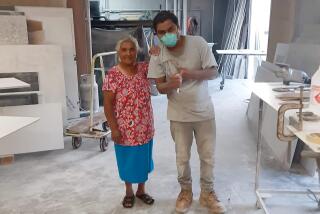Youth With AIDS Virus Loses Fight With Firm : Courts: Evidence that Cutter Laboratories provided the hemophiliac with a tainted blood product is insufficient, a judge rules.
- Share via
SANTA ANA — Channon Phipps, a 16-year-old hemophiliac, lost a court battle Monday against a West Coast pharmaceutical firm accused of providing tainted blood products that infected the teen-ager with the AIDS virus.
Superior Court Judge Donald E. Smallwood ruled that Channon’s case against Cutter Laboratories Inc. of Berkeley was based on “insufficient evidence.” Smallwood granted the firm’s motion declaring the case a “non-suit.”
“The judge found there was no evidence of wrongdoing against Cutter Laboratories,” said the firm’s attorney, Duncan Barr.
Channon and his aunt and legal guardian, Deborha Franckewitz, were not in court Monday for Smallwood’s decision and could not be reached for comment.
Channon’s attorney, Merwin Auslander, described the ruling as “a bitter experience.”
“It’s a blow,” Auslander said, not only for Channon, but “also other hemophiliacs” who have contracted the AIDS virus and may seek legal remedy against the pharmaceutical industry. Auslander said the trial judge severely limited which medical experts he could present and what questions they could be asked.
“In essence, the court has held that the only experts allowable would have to be somebody from the pharmaceutical industry. I take great issue with that. The pharmaceutical industry is not about to volunteer somebody to testify (against it),” Auslander said.
“This definitely is a setback for hemophiliacs,” said Howard Dahlka, executive director for the Hemophilia Foundation of Southern California in Pasadena.
Hemophilia is a rare, inherited blood disease whose victims do not produce the protein required for clotting. They are treated by injections of that protein, called Factor VIII, culled from the blood of thousands of donors and sold by Cutter under the brand name Koate.
There are about 20,000 hemophiliacs in the United States and about 200 in Orange County, experts say. Winning cases against the pharmaceutical companies is “very difficult” because the plaintiffs often have to pinpoint which tainted Factor VIII dosage was used, Dahlka and other advocates said.
“Often they change their dosages but don’t remember when the change occurred,” said Tracy Mahoney, a health educator at the Hemophilia Council of California AIDS Project in San Diego.
Mahoney and Dahlka said their organizations and others are discovering that as many as 80% to 90% of severe hemophiliacs who were getting blood coagulants between 1977 and 1984 have contracted acquired immune deficiency syndrome.
A decision to appeal Smallwood’s ruling is pending, Auslander said. He added that the family may not have the funds needed to pursue an appeal.
In an interview following Monday’s ruling, Barr disagreed with Auslander’s assessment of the judge’s restrictions on testimony by medical experts.
In fact, Barr said, the “expert” that Auslander put on the witness stand was a “professional witness,” whose testimony was limited only because he “lacked experience.”
Auslander argued that his expert, Dr. William O’Connor, a general practitioner in Vacaville, was qualified and cited O’Connor’s invitation to testify on the same issues before Congress. Auslander’s other expert, Dr. E. Garrott Allen, a professor emeritus at Stanford University, wasn’t permitted to testify, Auslander said.
“Those were my experts and he (Smallwood) did not permit them to testify or limited their testimony,” Auslander said.
The basis of Channon’s case was whether the company failed to pasteurize the blood coagulant suspected of infecting him with the AIDS virus.
The lawsuit, which was filed by Franckewitz, Channon’s aunt, in 1986, alleged that a UC Irvine College of Medicine physician had prescribed an unpasteurized blood coagulant manufactured by Cutter Laboratories from 1983 to 1984 when a pasteurized coagulant was already being marketed by a competitor.
In opening arguments, Barr told the jury that Channon had been infected before the AIDS virus was identified and before it was known that the disease could be transmitted by blood.
Barr said that even if Channon did contract AIDS from a Cutter product, there was no evidence of company wrongdoing. He also pointed out that Channon took Factor VIII made by other companies.
Franckewitz said in the lawsuit that she asked for the pasteurized product but was told that she must have Channon’s prescriptions filled at the UCI pharmacy, which had an exclusive contract with Cutter. Moreover, she said, on Oct. 31, 1983, Cutter recalled several vials of its coagulant because of possible AIDS contamination, but Channon was nonetheless given one of the recalled vials a month later.
The UC Board of Regents and the doctor settled the case out of court for a undisclosed sum in 1989. Cutter Laboratories offered the family a $15,000 settlement, which it refused, Franckewitz said.
More to Read
Inside the business of entertainment
The Wide Shot brings you news, analysis and insights on everything from streaming wars to production — and what it all means for the future.
You may occasionally receive promotional content from the Los Angeles Times.










